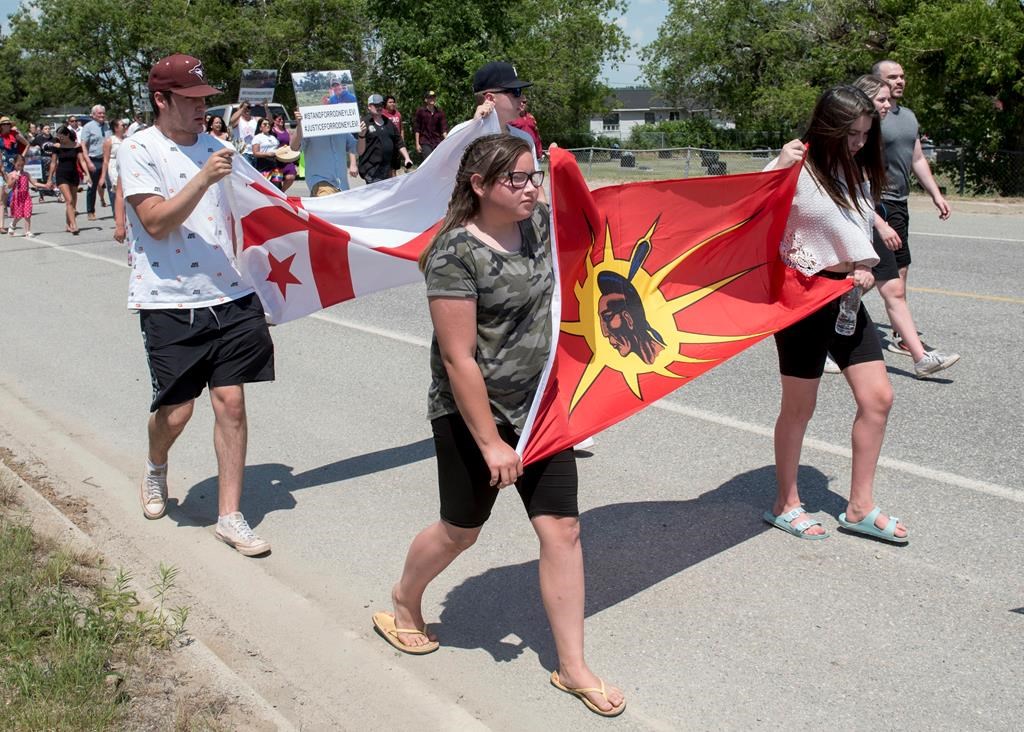Almost a month since the last meeting between New Brunswick premier Blaine Higgs and Indigenous leaders, talks about a public inquiry into the province’s justice and policing systems have not resumed.

Higgs has stood by his belief that any public inquiry should be led by the federal government, even as Chiefs across the province continue to ask for a New Brunswick-focused inquiry.
“I’ve said from the very beginning: this is bigger than New Brunswick. This is a national issue. Systemic racism is not confined to New Brunswick and this needs a federal lead,” Higgs said Wednesday.
In lieu of an inquiry, Higgs has continually pitched a sort of task force that would look at action items that could be implemented quickly to improve outcomes for Indigenous people in the system.
But Mi’gmawe’l Tplu’taqnn Inc. (MTI), an organization representing the nine Mi’gmaq First Nations in the province, says they have been seeking meetings with the ministers of public safety and justice to discuss reforms, albeit with little success.
“We’ve made numerous requests directly to Minister Urquhart’s and Minister Anderson-Mason’s offices to set up a meeting to discuss the items we feel could be immediately actioned within their respective departments but have not received a meeting date,” said Jennifer Coleman.
The action items highlighted by MTI range from police reform, including changes to training and the creation of unarmed “peacekeeper” officers as well as the use of Gladue Reports in the court system, which are a type of pre-sentence report prepared by many provinces for Indigenous offenders.
Some proposals were already handed to government during the last meeting with the Chiefs in July.
Higgs says he’s more than willing to get moving on reforms and expressed interest in being part of discussions himself.
“I’m very interested in pursuing that agenda and doing it quickly; that was my message from the very beginning,” Higgs said.

Get daily National news
“Let’s look at items that others have learned from, let’s look at the current issues we have in our province and how to address them.”
But Derek Simon, an advisor to MTI, says these action items do not replace the need for a public inquiry.
“We want to action the items we can but it shouldn’t be a pretext for not doing a deeper dive into some of those bigger, more deeper-rooted problems that maybe we don’t understand as well,” Simon said.
Simon said a New Brunswick-specific inquiry is needed to expose the systemic issues specific to the province and disputes Higgs’ claim that the federal government should lead it. The Marshall Inquiry, which took a look at the wrongful conviction of a Mi’gmaq man in Nova Scotia in the early 1970s, led to widespread changes to that province’s justice system.
According to Simon, a similar approach is needed in New Brunswick.
“The justice system in Nova Scotia remains far from perfect, but as someone who has had the experience of working in both provinces, I can tell you that it’s much further ahead in Nova Scotia in terms of having a deeper understanding of racism in the justice system,” he said.
“Administration of justice is a provincial jurisdiction. There are factors, there are experiences of racism that are unique to New Brunswick.”
Simon listed the court support workers program, that helps guide Indigenous people through the system, as well as an Indigenous specific recruitment program at the Schulich School of Law at Dalhousie University as positive steps taken in Nova Scotia.
There is interest in a public inquiry within Higgs’ cabinet, as well. Aboriginal Affairs minister Jake Stewart has supported a public inquiry since the beginning and told the Telegraph Journal on Tuesday that his opinion hasn’t changed.
Higgs said Wednesday that he wouldn’t allow himself to be “pushed into a corner” by Stewart and remains convinced that an inquiry should happen at the national level.
But as Indigenous leaders continue to fight for a public inquiry, the families of Chantel Moore and Rodney Levi are left to wait for answers.
Moore was shot and killed by an Edmundston police officer in early June during a wellness check. Levi was killed less than a month later during an encounter with the RCMP.
“Well, of course the greater risk is that it happens again,” said Levi family counsel Alisa Lombard.

Lombard says the Crown has continually failed in its obligations to Indigenous people in New Brunswick. She says the only way that will change is if all New Brunswickers demand better from the justice and policing system.
“It no longer becomes a matter of what is the nation going to do, what are the families going to do,” she said.
“No, what is the system going to do to ensure that the humanity of each and every one of its citizens, including First Nations people, is appropriately recognized and protected.”
Lombard said all New Brunswickers need to step back and ask themselves how they would want the government to respond if they lost a family member in a similar fashion to Moore or Levi.
“Things that you often hear is, ‘oh what a tragedy, jeez that’s so sad,’ but you can see the differential treatment and the differential reaction just in mainstream society when it comes to Indigenous tragedy versus mainstream tragedy and those reactions are very disparate,” she said.
“How would they feel if this is what they were getting from their government?”








Comments